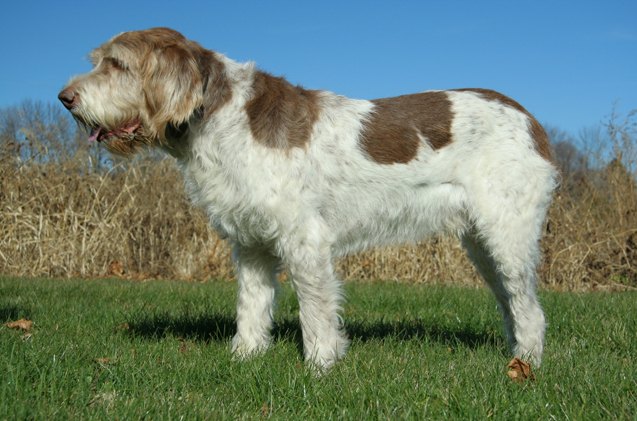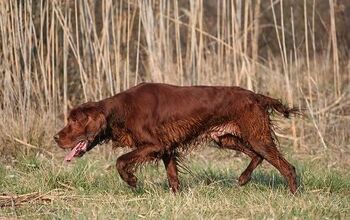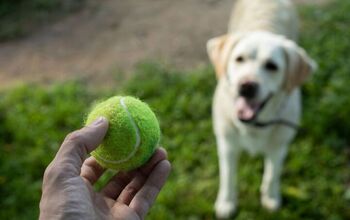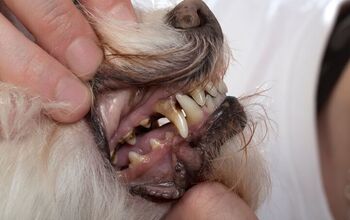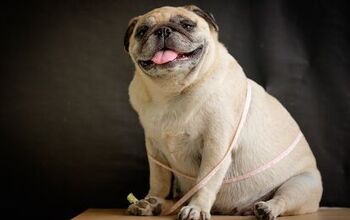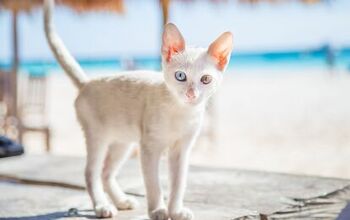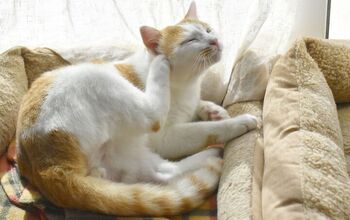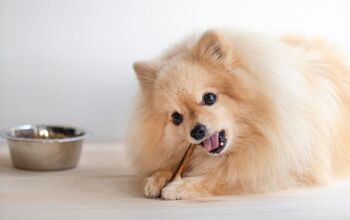Spinone Italiano


About Spinone Italiano
Also known as the Spinone, Italian Spinone or Italian Griffon, the Spinone Italiano looks more like a tired old man than the rugged pointer that it is. Bred in Italy as a specialist hunting dog, the Spinone is as intelligent as it is strong and has almost human-like eyes which lend to its gentle and almost pensive appearance.
Spinones are strong boned and solidly built with powerful muscles which allow it to navigate almost any terrain. Its body is covered in a thick, wiry coat which enables it to tolerate a wide range of environments. These characteristics make the Spinone Italiano an ideal hunting dog, a purpose which the breed is still used for today. The Spinone is also a highly versatile breed and can be used in showing, agility, obedience and therapy work.
Spinones are a very gentle and devoted breed of dog and live to please their owners. They are highly affectionate and get along extremely well with children and other pets. Their temperament is also fairly easier going that other hunting breeds.
Bred in Italy as a specialist hunting dog, the Spinone is as intelligent as it is strong
The Spinone Italiano is one of the oldest breeds to be developed as a pointer and its history as Italy’s all-purpose hunting dog can be traced as far back as 500 B.C. The first wirehaired pointing dogs were bred by ancient Italian hunters that needed large, powerful dogs that could navigate the tough Alpine and Apennine mountains and surrounding marshlands. There are references made in historical texts as old as 200 A.D of hunting dogs with the careful, productive hunting style that is typical of the Spinone. The middle ages saw even more consistent reports of wirehaired, large and companiable pointing dogs with hunting styles comparable to that of the Spinone. However, the breed saw a steep decline during the aftermath of World War II, and was only resuscitated through the efforts of dedicated breeders.
The Spinone is currently one of the most popular hunting dogs in Italy and several other European countries. It has however been slow to gain popularity in America.
Although the exact lineage of the Spinone Italiano is unclear it is believed that the breed originated as a cross of coarse-haired Italian Setters and dogs introduced by Greek traders as well as White Mastiffs and possibly French Griffons.
Spinones are highly energetic dogs and require a well-balanced diet. Keep in mind that their shaggy beards can leave trails of water around a home after a drink.
Spinone Italianos are extremely intelligent and highly trainable and require mentally challenging exercises as well as physically challenging ones.
Spinones are extremely intelligent and highly trainable and require mentally challenging exercises as well as physically challenging ones. A Spinone Italiano that has no ‘meaningful’ task can often turn destructive and moody. They are highly motivated and have a strong desire to please, and respond extremely well to positive reinforcement.
A powerfully built dog, the ideal weight for a full-grown Spinone male ranges from 75 to 85 pounds.
The Spinone Italiano is a much easier going breed compared to most other pointers. As a breed that has a long history of working with humans, they are also a highly sociable and are happiest when homed with a large family. Spinones should never be left alone for long periods of time.
They are highly affectionate towards children and are also very affable towards other pets. Spinones are extremely satisfied when treated as a lower-ranking member of the human pack-family and can sometimes be stubborn when faced with a lack of strong leadership.
The Spinone Italiano is a naturally cautious dog and can turn timid if not trained and socialized at an early age. It is also rarely aggressive and will only attack if its owners are directly under threat or assault.
As with most large breeds of dog, Spinone Italianos are susceptible to canine hip dysplasia and elbow dysplasia. Routine hip and joint examinations are recommended as the dog grows older. They may also suffer from minor issues such as allergies, otitis externa, ectropion, cerebellar ataxia, and gastric torsion.
A well-cared for Spinone has an average life expectancy of 12-14 years.
Spinones are highly energetic and should be exercised vigorously for at least an hour each day. Spinones enjoy long jogs and their adaptability to various terrains makes them excellent hiking companions. They should not be kept by families living in apartments or small homes with no gardens.
The Spinone Italiano is a much easier going breed compared to most other pointers.
The AKC has this to say on Spinones: “An excellent retriever by nature and an experienced hunter on any terrain, the Spinone is robust, sociable and docile. His wiry, dense coat and thick skin enable him to negotiate underbrush and endure cold water that would severely punish any dog not so naturally armored. The coat can be solid white; white and orange; orange roan with or without orange markings; white with brown markings, brown roan with or without brown markings.”
The Spinone’s coat is tough and slightly wiry. The ideal length is 1.5 to 2.5 inches on the body. Spinone’s require minimum maintenance in terms of grooming and can be stripped occasionally to remove dead hairs. In addition, it is recommended that they be brushed once a week to maintain a healthy coat. They should not be over-groomed until their coats take on a soft, silky appearance.
As with most other intelligent hunting breeds, Spinone Italiano puppies should be socialized and trained as early as possible.
Photo credit: ©iStock.com/QUAYSIDE; ©iStock.com/Zuzule; ©iStock.com/Flatcoater

Amy Tokic, Editor of PetGuide.com, is a passionate animal lover and proud pet parent of Oscar, a Shih Tzu/Chihuahua cross, and Zed, a Japanese Chin. Her love of animals began in kindergarten, when she brought her stuffed dog Snoopy into class with her every day. Now, she writes about her adventures in pet ownership and tirelessly researches products, news and health related issues she can share with other animal enthusiasts. In her free time, Amy loves perusing used book and record stores, obsessing over the latest pet products available and chasing squirrels with wild abandon (a habit attributed to spending too much time with her pooches).
More by Amy Tokic



